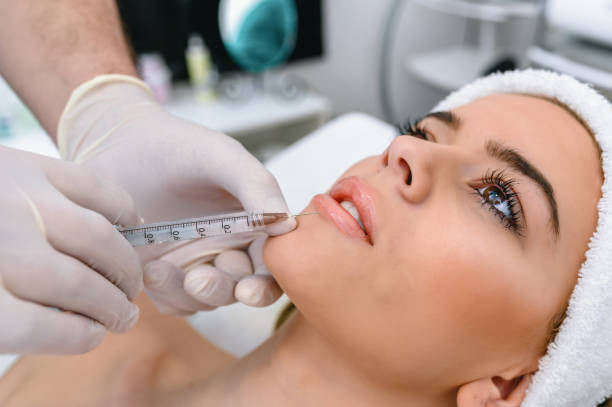First time visitor? Pick $100 towards treatment of your choice in Solea MedSpa or pick the Promo


Pregnancy often brings a renewed focus on wellness and safety. From the foods you eat to the beauty products you apply, many decisions suddenly come under scrutiny. One common question that surfaces—especially among women who prioritize aesthetics—is whether it’s safe to receive lip fillers while pregnant. The desire to maintain a beauty routine is understandable, but it’s important to explore what science, clinical judgment, and medical experts say about dermal injectables during this time.
Understanding Fillers and Their Common Uses
Cosmetic injectables are typically used to add volume, smooth out lines, or subtly reshape facial features. Products like Juvederm and Restylane rely on hyaluronic acid, a molecule your body naturally produces. These formulas are FDA-approved for aesthetic use in adults and are widely known for their predictable, temporary results. While they’re often considered low-risk for the general population, the context shifts significantly during pregnancy.
Why the Science Is Inconclusive
One of the primary concerns with getting lip filler while pregnant is the absence of controlled studies involving expectant mothers. Pregnant women are routinely excluded from clinical trials due to ethical and safety concerns, which means there’s no reliable data confirming whether these treatments pose risks to fetal development.
Even though the ingredients in most hyaluronic-based products are bio-compatible, that alone doesn’t make them automatically suitable during gestation. Without rigorous research, any injection becomes a gray area—particularly when complications or unexpected reactions could occur.
Provider Caution: Why Most Experts Advise Against It
Medical professionals across dermatology and aesthetics generally recommend postponing any non-urgent procedure during pregnancy, including lip fillers when pregnant. The reasoning is clear: elective treatments that don’t offer direct medical benefit should be avoided when they carry even the slightest potential for harm.
Nicole Devincentis, MPA, PA, and founder of Glowtox NYC, emphasizes this: “There’s no proven safe threshold for injectables in pregnancy. Even though the risk may be theoretical, why introduce variables when your body is already undergoing so many changes?”
Potential Risks During Pregnancy
While rare, side effects from fillers can and do happen—even in healthy, non-pregnant individuals. These may include:
- Swelling or bruising beyond the normal post-injection response
- Inflammatory reactions to the gel or carrier molecules
- Infection at the injection site
- Vascular occlusion, where the product is inadvertently injected into a blood vessel, requiring urgent reversal
If any of these issues arise during pregnancy, managing the complications becomes significantly more complicated. The medications commonly used to dissolve filler or reduce inflammation (like hyaluronidase or corticosteroids) haven’t been thoroughly tested in pregnant populations either.
Even the stress of an unexpected complication can have downstream effects, including elevated cortisol levels or systemic inflammation—factors that matter when you’re carrying a child.
But What If You Didn’t Know You Were Pregnant?
A not-uncommon concern: “I got lip fillers and didn’t know I was pregnant.” If you’re in this situation, don’t panic. A single procedure performed before you were aware of your pregnancy is unlikely to cause harm. However, it’s essential to inform your OB-GYN and aesthetic provider right away. Going forward, treatments should be paused until after your delivery—and ideally until after breastfeeding if applicable.
What Happens If You Get Lip Filler While Pregnant?
While there’s no definitive evidence outlining severe consequences from getting lip filler when pregnant, the absence of proof doesn’t equate to proof of safety. The medical principle of “do no harm” guides most providers to avoid treatments that aren’t urgent.
Additionally, pregnancy hormones can alter your body’s response to cosmetic procedures. Increased fluid retention, changes in skin elasticity, and immune sensitivity might all affect how the injectable settles or how your body reacts.
Are Any Aesthetic Treatments Safe During Pregnancy?
If you’re craving self-care, you’re not out of options. While injectables are best postponed, other treatments can support your glow without risk. These include:
- Hydrating facials using gentle, pregnancy-safe ingredients like vitamin C or niacinamide
- Lymphatic drainage massage, especially helpful for puffiness
- Oxygen facials that boost skin vitality without chemical exposure
- Mild exfoliating treatments, such as microdermabrasion or enzyme-based peels (always disclose your pregnancy to your provider)
These alternatives offer a refreshed look and a sense of indulgence without compromising your health—or your baby’s.
Postpartum Planning: When Can You Resume?
If you paused injectables during your pregnancy, you’re not alone—and you’re not locked out of aesthetic care forever. Many women choose to revisit lip filler after pregnancy, often as part of a broader postpartum self-care reset. Once your body has recovered and you’ve concluded breastfeeding (if applicable), it’s typically safe to resume treatments.
You may even find that your goals shift. Some clients opt for subtle enhancements post-baby, while others pursue a more customized rejuvenation plan that reflects how their skin and face have changed.
So… Is It Safe To Get Lip Filler While Pregnant
In a world where beauty options are endless, knowing when to pause is just as important as knowing when to start. With no conclusive safety data, a lack of regulatory approval for use during pregnancy, and the possibility of complications, most experts agree: lip fillers while pregnant aren’t worth the risk.
There’s plenty of time to explore aesthetic treatments after your pregnancy journey is complete. For now, focus on what your body is accomplishing. Looking good can wait—feeling good about your decisions doesn’t have to.
Questions? Get a
-

Solea Medical Spa and Beauty Lounge your first and final destination for all your beauty and medical needs.
305-912-2155
info@soleabeautylounge.com
18140 Collins Ave, Sunny Isles Beach, FL, 33160, United States
- Body Treatments
- Health And Wellness Treatments
- Medical Treatments
- Facial Treatments
